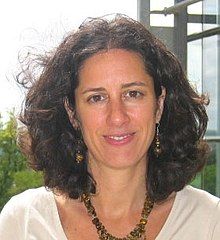Nadje Sadig Al-Ali
Nadje Sadig Al-Ali | |
|---|---|
 | |
| Born | 1966 (age 57–58) |
| Academic background | |
| Education | |
| Academic work | |
| Institutions | |
Nadje Sadig Al-Ali (born 1966; Arabic: نادية صادق العلي) is a German-Iraqi[1][2] academic of social anthropology and Middle East studies and feminist activist. She is currently the Robert Family Professor of International Studies at Brown University and director of Middle East Studies at Brown's Watson Institute for International and Public Affairs.[3] From 2010 to 2018, Al-Ali taught at SOAS University of London as a professor of gender studies.[4]
Life
[edit]Nadje Sadig Al-Ali was born to an Iraqi father and German mother in Germany.[5] She did not learn Arabic as a child, and has not lived in Iraq; in a 2006 article she expressed discomfort with the "essentializing and simplistic" way the term ‘Iraqi’ has been ascribed to her "by the Western media, academia and Iraqi women alike."[2]
Al-Ali was raised in North Rhine-Westphalia, Germany, where she lived until the age of 18. She attended the University of Arizona where she earned a BA from the Middle East Studies Department.[6] In 1989, she moved to Cairo, Egypt, where she completed her MA at The American University in Cairo. During this time, she became involved in the Egyptian women's movement.[7]
Career
[edit]In 1994, Al-Ali moved to London to begin work towards her doctorate at SOAS University of London; she received her PhD in Social Anthropology from SOAS 1998. Al-Ali served as Professor of Gender Studies at SOAS from 2010 to 2018 and chaired the Centre for Gender Studies from 2017 to 2018.[8]
She served as President of the Association of Middle East Women's Studies (AMEWS) from 2010 to 2012.[8]
Alongside her academic career, Nadje Al-Ali is a political activist and was a founder of the Iraqi British organisation Act Together: Women's Action for Iraq[9] in 2000. She is also a member of the London branch of Women in Black, a worldwide network of women who are against war and violence.
Many of her publications reflect the lives of Iraqi women and recent struggle to voice their opinions during the US-led invasion of Iraq.
Bibliography
[edit]- Iraqi Women: Untold Stories from 1948 to the Present (2007)
- New Approaches to Migration (2002)
- Secularism & the State in the Middle East: The Egyptian Women’s Movements (2000)
- Gender Writing/Writing Gender: The representation of women in a selection of modern Egyptian literature (1994).[10]
- What Kind of Liberation? Women and the Occupation of Iraq (with Nicola Pratt, 2009)
References
[edit]- ^ "Interview - Nadje Al-Ali". E-International Relations. 2016-01-30. Retrieved 2021-12-20.
- ^ a b Pratt, Nicola (2006-01-01). "Researching Women in Post-invasion Iraq: Negotiating "Truths" and Deconstructing Dominant Discourses". Bulletin of the Royal Institute for Interfaith Studies.
- ^ "Nadje Al-Ali | Watson Institute". Watson Institute for International and Public Affairs. Retrieved 2021-12-20.
- ^ Nadje Sadig Al-Ali (May 2007). "Iraq's women under pressure". Le Monde Deplomatique. Retrieved 22 July 2010.
- ^ Susannah Tarbush (2007-05-03). "New book by Nadje Sadig Al-Ali gives a voice to Iraqi women". daralhayat.com. Archived from the original on July 16, 2011. Retrieved 22 July 2010.
{{cite web}}: CS1 maint: unfit URL (link) - ^ "An Iraqi professor on a Gender Studies international stage". Al Arabiya English. 2015-11-29. Retrieved 2021-12-20.
- ^ Al-Ali, Nadje (2014-02-01). "Reflections on (Counter) Revolutionary Processes in Egypt". Feminist Review. 106: 122–128. doi:10.1057/fr.2013.35. S2CID 143255486.
- ^ a b Al-Ali, Nadje (January 2019). "Curriculum Vitae: Nadje Sadig Al-Ali" (PDF).
- ^ "Act Together - Legal Advise [sic] for Women". Act Together. Archived from the original on 2021-06-27. Retrieved 2021-06-30.
- ^ "Professor Nadje Al-Ali | Staff | SOAS University of London". www.soas.ac.uk. Retrieved 2016-11-26.
